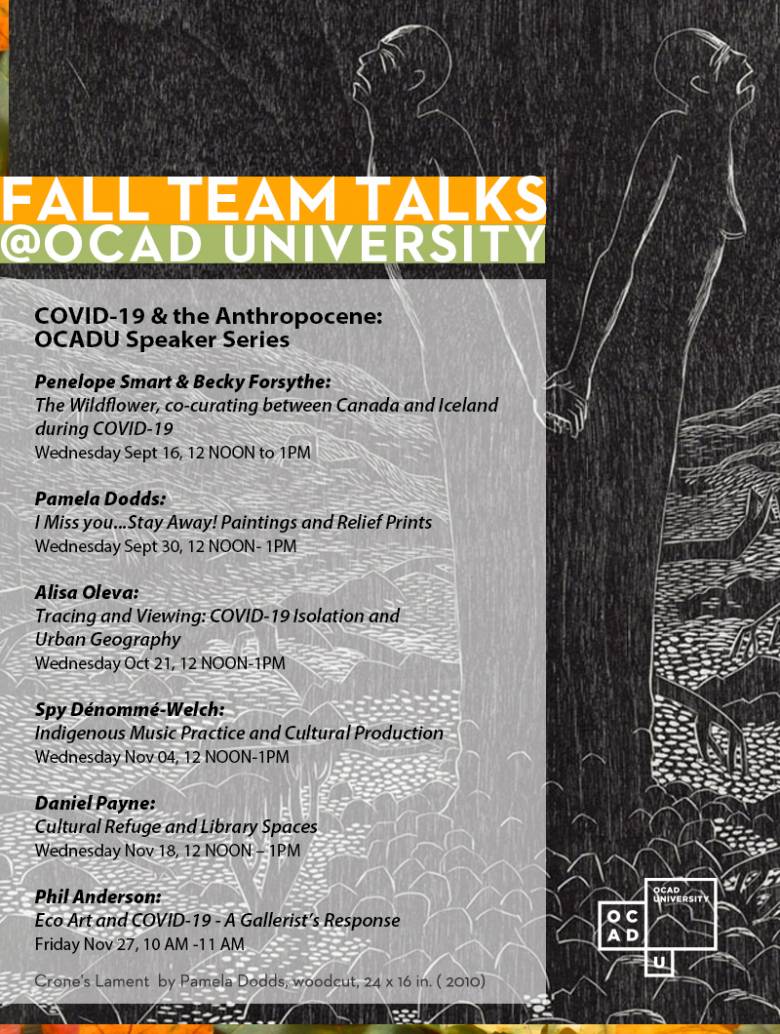
Students in Materials and the Anthropocene, an OCAD U undergraduate course in the Faculty of Art, are creatively investigating connections between anthropogenic processes and the current COVID-19 crisis. Our speaker series was designed in response to this criterion. It also speaks to a current OCADU research project, COVID-19 Anxiety, lead by Pam Patterson, that aims to interconnect the larger OCAD U community and provide resources for art educators during these pandemic times. Speakers are artists, curators, a gallerist and a librarian.
Curators Talk (LIVE on Teams Wednesday Sept 16, 12 to 1 p.m.)
Penelope Smart and Becky Forsythe: The Wildflower, co-curating between Canada and Iceland during COVID-19
The Wildflower (Villiblómið) is a large-scale international curatorial project that tells a new story of climate change in northern landscapes. Urging forward a renewed interest in traditional materials connected to local culture in Iceland and northern Canada, co-curators Penelope Smart & Becky Forsythe reveal how artists transform wood, marble, plant dye, flowers, and metal into new visions of textile, sculpture, painting and stained-glass armour. Using the exhibit as a way into questions of familiarity, disruption and change, Smart & Forsythe also talk about international curating in the time of COVID.
Penelope Smart is a curator and writer based in Hamilton, ON. Becky Forsythe is a curator based in Iceland.
Artist Talk (Live on Teams, Wednesday Sept 30, 12 to 1 p.m.)
Pamela Dodds: I Miss you...Stay Away! Paintings and Relief Prints www.pameladodds.net
Pamela Dodds explores location and relationship through a discussion of her work within the context of the Anthropocene and the COVID-19 pandemic.
Dodds’ visual arts practice, in painting and printmaking, explores the complexities and nuances of human relationships, primarily though not exclusively, through figure-based imagery. Drawing from a feminist, lesbian sensibility, she is inspired by the challenges of intimacy and the experience of longing and desire.
Artist Talk (LIVE on Teams, Wednesday Oct 21, 12 to 1 p.m.)
Alisa Oleva: Tracing and Viewing: COVID-19 Isolation and Urban Geography
Since the pandemic started what have you not done that you used to regularly? What are the new habits and routes you will take with you to the future and which ones will you leave behind? As all Alisa Oleva’s art projects were cancelled and trips suspended, she started to tune into COVID times to see how this might influence her art practice, exploring how things were changing and what she cared about. In this talk, Alisa will share how her practice has changed during the pandemic and which works she created in the lockdown within the wider context of her art practice.
Born 1989 in Moscow. Based in London. Alisa Oleva holds an MA in Performance from Goldsmiths. She treats the city as her studio and urban life as material, to consider issues of urban choreography and urban archaeology, traces and surfaces, borders and inventories, intervals and silences, passages and cracks. Her projects have manifested as a series of interactive situations, performances, movement scores, personal and intimate encounters, parkour, walkshops, and audio walks. She has made work site-specifically in various cities: London, Manchester, Leeds, Berlin, Belgrade, Pori, Minsk, Kyiv, Dnipro, Mariupol, Moscow, Norilsk.
Artist/Research Talk (LIVE on Teams, Wednesday Nov 4, 12 to 1 p.m.)
Spy Dénommé-Welch: Indigenous Music Practice and Cultural Production
Spy Dénommé-Welch (Anishnaabe) is an interdisciplinary academic, composer, librettist/playwright and producer. Spy’s academic research focuses on topics including Indigenous education, arts, music and performance.
He wrote and co-composed the Dora Mavor Moore-nominated opera Giiwedin. Other credits include: RADAR (2019), Contraries: a chamber requiem (2018), Sojourn (2017); HATE MAIL & Irreconcilable Trolls (2017); Bottlenecked (2017); Victorian Secrets (2014); Spin Doctors (2014); Bike Rage (2013).
Librarian/Researcher Talk (LIVE on Teams, Wednesday Nov 18, 12 to 1 p.m.)
Daniel Payne: Cultural Refuge and Library Spaces
By looking to interpretations of space as place, OCAD University Librarian Daniel Payne will advocate that libraries are essential for navigating our anthropocentric future. With a firm grounding in public values, libraries create cultural refuges that ensure equitable access to the information we need for reacting to the Anthropocene age.
Daniel Payne is Head of Reference & Instructional Services at OCAD University’s Dorothy H. Hoover Library. He has promoted an active, innovative information literacy program at OCAD U that includes a site intervention curriculum where studio-based pedagogy is used to facilitate the creation of site-specific works designed to be embedded in the library’s physical space.
Gallerist Talk (LIVE on Teams, Friday, Nov 27, 10 to 11 a.m.)
Phil Anderson: Eco Art and COVID-19 - A Gallerist’s Response
Phil Anderson, Director, Gallery 1313 discusses the role of his artist-run-centre in both the Parkdale and Toronto communities and as a focus for local and international art activity. He will speak specifically to his Eco-Art and recent COVID-19 online exhibits.
Phil Anderson has been Executive Director, Gallery 1313, Toronto since January 1997 curating many exhibitions and events at the gallery. He was a founding member and former Chair of the Parkdale Village Arts Collective (1994) and has been on the Board of Directors for organisations such as Artscape, Artist-Run Centres & Collectives of Ontario, the Parkdale Arts and Cultural Community Board, and the Parkdale Liberty Economic Development Corporation. Anderson helped organize festivals such as Round-Up and Third Rail and was a founding member of the film screening collective VisionEdge. He is co-publisher of Artoronto.ca, an online arts magazine, and continues practising as a photo-based artist. Anderson has been honoured with several awards such as the ACKER and the Queens Jubilee Award.